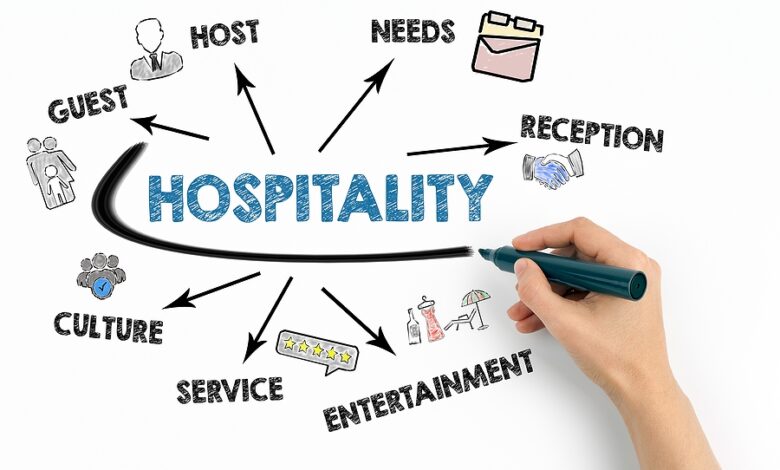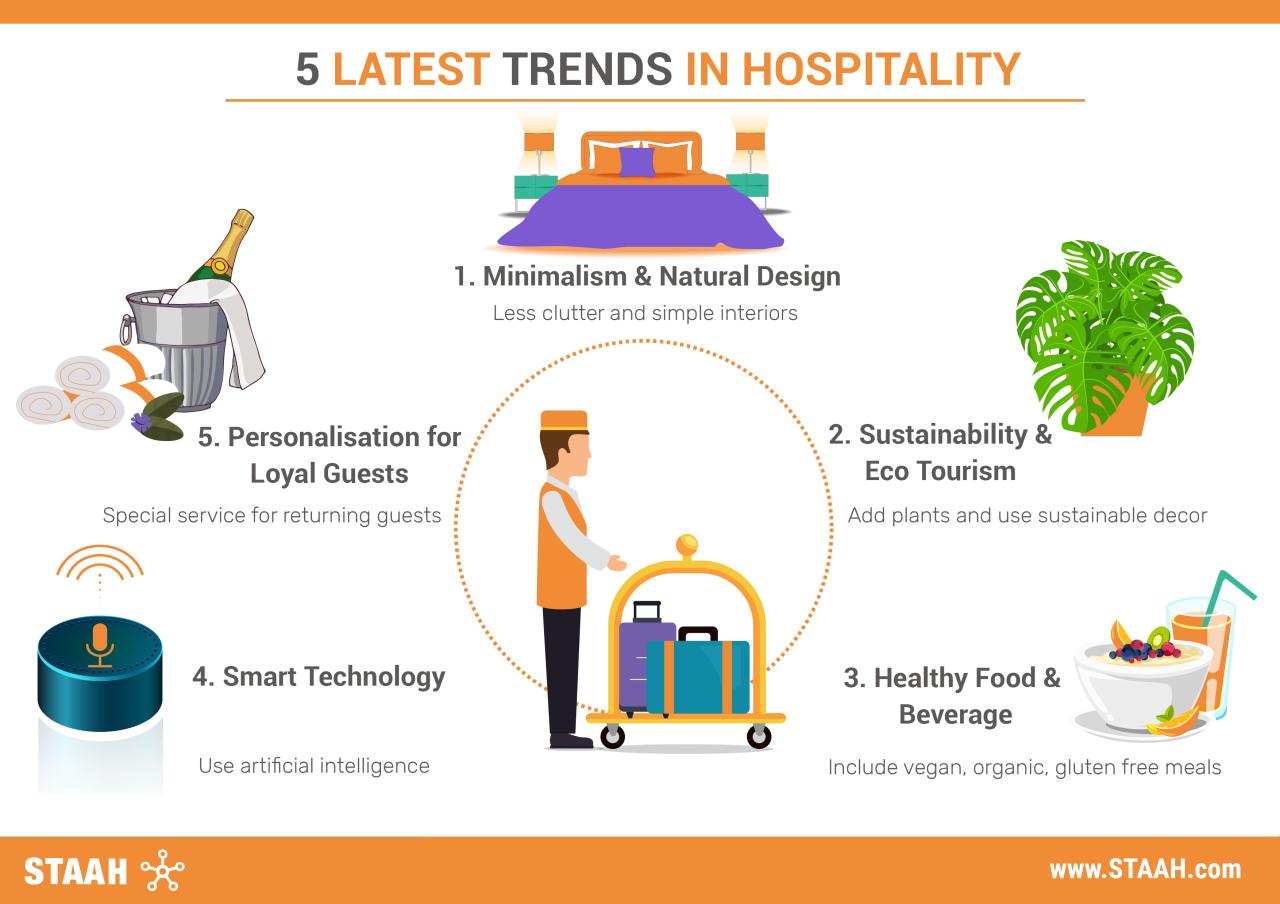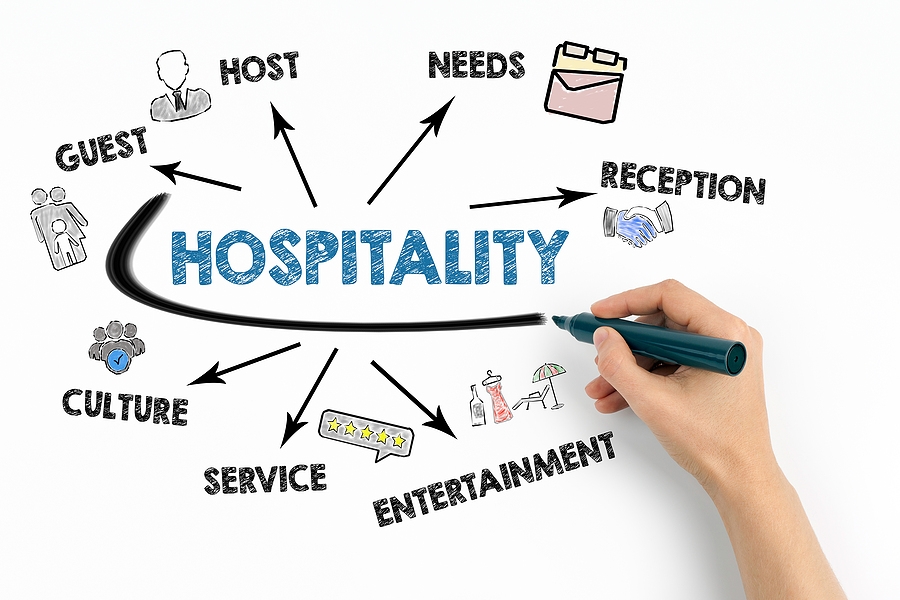
The Revolution of Hospitality Work A New Era
The revolution of hospitality work is transforming the industry, bringing with it a wave of technological advancements, shifting customer expectations, and a complete reshaping of worker roles. From AI-powered customer service to personalized experiences, the future of hospitality is rapidly evolving. This blog post delves into the multifaceted changes, exploring the impacts on workers, customers, and the future of the industry itself.
This transformation is not just about new tools; it’s about fundamentally altering how we interact with hospitality, from the front desk to the back of house. Understanding these shifts is crucial for anyone involved in or interested in the hospitality sector.
Defining the Revolution
The hospitality industry, a cornerstone of global economies, is undergoing a profound transformation. This revolution isn’t simply about new technologies; it’s a fundamental shift in how we interact, experience, and deliver hospitality. From the humble inn to the modern hotel chain, the industry has always adapted to changing needs and expectations. But the pace and scale of this current evolution are unprecedented.
The blending of technology, evolving customer desires, and a renewed focus on personalization are reshaping the landscape, creating opportunities and challenges for businesses and employees alike.This shift is driven by a confluence of factors. The increasing accessibility of information, the rise of digital natives, and the pervasiveness of social media are all impacting how customers perceive and interact with hospitality services.
This dynamic environment demands businesses to be agile and innovative to remain competitive. Furthermore, this revolution is pushing for greater transparency, sustainability, and ethical considerations in the industry’s operations.
Current State of Hospitality Work
The hospitality industry today is characterized by a complex interplay of traditional service models and cutting-edge technologies. Frontline workers, from hotel staff to restaurant servers, often juggle multiple tasks and responsibilities in fast-paced environments. This often includes managing customer expectations, resolving issues, and ensuring smooth operations. This dynamic requires significant interpersonal skills and adaptability. Simultaneously, the industry is increasingly reliant on technology to streamline processes, personalize experiences, and improve efficiency.
Technological Advancements
Recent technological advancements have significantly impacted hospitality operations. Mobile ordering and payment systems are becoming commonplace in restaurants and hotels, allowing for faster service and greater convenience. AI-powered chatbots are being used to handle customer inquiries and reservations, freeing up human staff to focus on more complex tasks. Smart room technologies in hotels, such as automated lighting and temperature controls, are enhancing guest comfort and convenience.
Furthermore, data analytics tools are allowing businesses to better understand customer preferences and tailor their offerings accordingly.
Key Shifts in Customer Expectations and Behaviors
Customers today expect seamless and personalized experiences. They are increasingly drawn to establishments that demonstrate a deep understanding of their needs and preferences. Real-time communication and instant access to information are paramount. Moreover, customers are increasingly demanding sustainable and ethical practices from businesses. This includes using eco-friendly products, supporting local communities, and demonstrating social responsibility.
Major Trends Reshaping the Industry
Several major trends are reshaping the hospitality industry. The growing popularity of experience-based tourism is driving a demand for unique and memorable experiences. Sustainability is becoming a crucial factor in consumer choices, leading businesses to prioritize eco-friendly practices. Furthermore, the rise of the gig economy is impacting staffing models, with more temporary and freelance workers entering the industry.
Finally, a focus on personalized service and tailoring experiences to individual preferences is emerging as a key differentiator.
The hospitality industry is undergoing a massive transformation, driven by tech and changing guest expectations. It’s fascinating to see how this revolution is impacting everything from booking platforms to personalized service experiences. For instance, exploring how new tech is changing the hospitality world, check out this interesting perspective on the future of the industry: Hello world!.
Ultimately, this revolution is shaping a more efficient and customer-centric hospitality experience for everyone.
Historical Context of Hospitality Work
Hospitality has a long and rich history. From ancient inns providing travelers with shelter and sustenance to the development of elaborate palace hotels, the industry has always evolved alongside societal needs and technological advancements. Historically, hospitality was often tied to the needs of travelers and the elite. Over time, the industry has broadened to cater to a wider range of needs and preferences.
The Concept of “Revolution” in Hospitality
The “revolution” in hospitality is not a sudden, dramatic upheaval. Instead, it represents a gradual yet significant transformation. This evolution is driven by a complex interplay of technological advancements, shifting customer expectations, and evolving industry trends. The core of this revolution is a paradigm shift in how hospitality is delivered and experienced, moving away from traditional models towards personalized, dynamic, and data-driven approaches.
This is ultimately aimed at enhancing the customer journey and providing experiences that are more satisfying and memorable.
Technological Transformations
The hospitality industry is undergoing a rapid transformation, driven largely by technological advancements. From streamlining operations to enhancing the guest experience, technology is reshaping every aspect of the sector, demanding adaptability from both employees and customers. This revolution is not just about replacing human interaction; it’s about augmenting it, creating more efficient and personalized services.The traditional hospitality roles, once largely focused on manual tasks and face-to-face interactions, are now increasingly intertwined with technological tools.
Check-in procedures, reservations, and even concierge services are often handled by sophisticated software and AI-powered systems. This shift demands a new skill set from hospitality workers, requiring them to not only understand the technology but also to use it effectively to provide exceptional service.
Impact on Job Roles
Hospitality jobs are evolving from being primarily focused on physical tasks to incorporating technological proficiency. Front desk agents, for instance, now need to navigate complex reservation systems and handle guest queries through various digital channels. Similarly, housekeeping staff might use mobile apps for inventory management and task assignment, while chefs could leverage digital ordering systems and recipe databases.
The role of the concierge has also transformed, evolving from a primarily human-interaction role to a combination of technological expertise and interpersonal skills. This blend of human touch and technological savvy is crucial for success in the modern hospitality landscape.
Technological Tools in Modern Hospitality
A variety of technological tools are now integral to the hospitality industry, enabling more efficient operations and a superior guest experience. These tools range from basic software applications to advanced AI-powered systems.
| Tool | Description | Impact on Workers | Impact on Customers |
|---|---|---|---|
| Online Booking Systems | Platforms for managing reservations, room availability, and payments. | Reduces manual workload, improves accuracy, and enables real-time updates. | Provides ease of booking, instant confirmation, and transparent pricing. |
| Point of Sale (POS) Systems | Software for processing payments, managing inventory, and tracking sales. | Streamlines transactions, reduces errors, and provides real-time sales data. | Faster checkout, improved accuracy in billing, and potential for loyalty programs. |
| Guest Relationship Management (CRM) Systems | Software for managing customer interactions and data. | Facilitates personalized interactions, allows for targeted marketing, and improves service efficiency. | Personalized offers, tailored recommendations, and a more consistent experience across interactions. |
| Mobile Apps for Guests | Applications for managing bookings, ordering food, accessing information, and controlling room settings. | Allows for remote access and control, enabling staff to assist guests more efficiently. | Provides convenience, control, and personalized services directly on their mobile devices. |
| AI-Powered Chatbots | Software for answering guest questions, providing information, and handling basic requests. | Frees up staff for more complex tasks, 24/7 availability, and faster response times. | Provides instant answers, 24/7 support, and seamless access to information. |
AI and Automation in Customer Service
AI and automation are significantly impacting customer service in hospitality. AI-powered chatbots can handle routine inquiries, answer frequently asked questions, and provide basic assistance, freeing up human agents to focus on more complex issues and personalized interactions. Automated check-in and check-out processes reduce wait times and improve efficiency. However, the crucial role of human interaction remains, particularly in situations requiring empathy and problem-solving beyond programmed responses.
Online Platforms and Social Media
Online platforms and social media have revolutionized the way hospitality businesses interact with customers. Online travel agencies (OTAs) provide a crucial channel for bookings and marketing. Social media allows for direct communication with guests, building brand loyalty, and gathering feedback. Businesses can use social media to highlight special offers, showcase their facilities, and respond to customer concerns in real-time.
Data Collection and Use in Hospitality
Hospitality businesses collect and use vast amounts of data to enhance guest experiences and optimize operations. This data includes booking information, guest preferences, feedback, and even social media interactions.
| Data Type | Source | Use Case |
|---|---|---|
| Booking Data | Online booking systems, reservation platforms | Identifying trends, optimizing room allocation, predicting demand, and personalizing offers. |
| Guest Feedback | Surveys, online reviews, social media | Identifying areas for improvement, understanding guest preferences, and enhancing services. |
| Customer Interaction Data | CRM systems, chatbots, email communications | Personalizing communication, tailoring offers, and understanding customer needs. |
Impact on Workers: The Revolution Of Hospitality Work
The hospitality industry, historically reliant on human interaction, is undergoing a profound transformation. Automation, AI, and digital platforms are reshaping the landscape, demanding new skills and approaches from both front-line staff and managers. This shift presents both challenges and opportunities for workers, requiring a proactive approach to adaptation and training.The changing nature of hospitality necessitates a re-evaluation of traditional roles and responsibilities.
Workers need to adapt to the integration of technology into their daily tasks, learning to utilize new tools and platforms for efficiency and customer service. This evolution demands a willingness to embrace continuous learning and skill development.
New Skills Needed by Hospitality Workers
The hospitality industry is evolving beyond basic service. Workers need to master digital platforms for reservations, communication, and customer interaction. Proficiency in data analysis and customer relationship management (CRM) software is becoming increasingly important for understanding guest preferences and tailoring experiences. Technical skills like basic coding, data entry, and troubleshooting digital systems are becoming essential. Furthermore, understanding how AI and automation can augment their work is crucial.
Challenges Faced by Existing Workers
Adapting to these changes can be challenging for existing workers. The fear of job displacement is real, especially for those lacking digital literacy or the resources to acquire new skills. Furthermore, the rapid pace of technological advancements can feel overwhelming, leading to anxieties about staying relevant and competitive. There’s also the challenge of overcoming potential resistance to change within the workplace, requiring both management and worker buy-in.
Training Programs Addressing New Skills
Several training programs are emerging to equip hospitality workers with the necessary skills. These programs often focus on digital literacy, customer relationship management, and data analysis. Many organizations are also offering certifications and online courses, allowing workers to develop the skills needed for the evolving industry at their own pace. Universities and vocational schools are also expanding hospitality curricula to incorporate technology and data-driven approaches.
For example, some programs focus on equipping staff with proficiency in platforms like online booking systems and mobile payment apps.
Potential for Job Displacement and Retraining Opportunities
While some jobs may become automated, the revolution in hospitality also creates new roles. For instance, the need for professionals specializing in AI-powered customer service or data analysis is increasing. Retraining programs are essential for helping displaced workers transition to these new roles. Government initiatives, industry partnerships, and employer-sponsored programs can facilitate this transition. This might include assisting with skills assessments, providing funding for courses, and offering job placement assistance.
Evolving Roles of Management in this New Environment
Hospitality managers need to adopt a proactive approach to the technological transformation. They need to foster a culture of continuous learning and innovation within their teams. Furthermore, managers must actively participate in training and development initiatives to ensure their teams are equipped to handle the new demands. Effective managers will prioritize clear communication, transparency, and support throughout the transition process.
The role of the manager shifts from overseeing tasks to guiding and empowering teams in navigating technological change.
Changing Employee-Employer Relationship
The employee-employer relationship is evolving. Workers expect more flexibility, opportunities for growth, and a better understanding of the value they bring to the company. Technology allows for remote work and flexible schedules in certain areas of hospitality, changing the nature of the employment relationship. A focus on employee well-being and recognition is crucial in fostering a positive work environment.
Employers need to provide adequate support and resources to help employees adapt to the new technology and work practices.
Impact on Customers

The hospitality revolution is reshaping the customer experience, moving beyond traditional interactions to embrace a dynamic and personalized landscape. Customers are increasingly demanding seamless, integrated, and anticipatory service, fueled by their digital-first experiences. This shift presents both opportunities and challenges for hospitality providers.The evolution of customer expectations is intricately linked to the pervasive influence of technology. Customers now expect immediate access to information, personalized recommendations, and 24/7 support.
They’re not just seeking a place to stay or a meal; they’re seeking an experience that caters to their individual needs and preferences. This demand for personalization extends across all aspects of the hospitality industry.
Changes in Customer Experience
The revolution in hospitality is dramatically altering customer experience, with a notable shift towards digital integration and personalized interactions. Customers are more empowered and informed than ever before, influencing choices based on real-time reviews, social media trends, and comparative pricing across platforms. This increased transparency and accessibility reshape how businesses build relationships with their clients.
New Customer Expectations and Preferences
Customers now anticipate personalized service and seamless experiences across multiple touchpoints. Instantaneous responses to queries, customized recommendations based on past interactions, and proactive service offerings are increasingly expected. Real-time information access, including updated availability, pricing, and reviews, is essential.
Evolution of Personalized Experiences, The revolution of hospitality work
Personalized experiences are becoming increasingly sophisticated. From pre-arrival recommendations tailored to individual preferences to in-stay entertainment options curated based on past behavior, hospitality businesses are leveraging data to create bespoke experiences. For instance, a hotel might suggest local attractions based on a guest’s stated interests, or a restaurant might offer a personalized menu based on the guest’s dietary restrictions and past orders.
Hospitality Sectors and Customer Experiences
The impact on customer experiences varies across hospitality sectors. Hotels are leveraging mobile apps for check-in, room service, and concierge services, while restaurants are using online ordering and reservation systems to streamline operations and enhance efficiency. Experiential venues, such as theme parks and entertainment centers, are using digital platforms for interactive maps, show schedules, and virtual queues to cater to the needs of their guests.
Examples of Customer Interactions with Advanced Technologies
Advanced technologies are revolutionizing customer interactions. Guests can use mobile apps to control lighting, temperature, and entertainment in their rooms, or order room service with a few taps. Restaurants are implementing online ordering and delivery systems, facilitating faster and more convenient service. Interactive kiosks in hotels provide information on local attractions, transportation options, and other services. This allows for 24/7 access to information, which contributes to a positive customer experience.
Impact of Digital Channels on Customer Feedback
Digital channels have significantly impacted customer feedback. Online review platforms and social media have become essential avenues for customers to share their experiences. This allows businesses to gather real-time feedback and address issues proactively. Real-time feedback analysis helps hospitality providers identify areas for improvement and tailor their services to better meet customer needs. Businesses can use social listening tools to monitor online conversations about their brand and respond to customer concerns in a timely manner.
Future of Hospitality Work

The hospitality industry is undergoing a rapid transformation, driven by technological advancements and evolving customer expectations. This evolution isn’t just about automating tasks; it’s about redefining the entire guest experience and the roles within the industry. The future of hospitality work will demand a blend of human interaction, technological proficiency, and a deep understanding of customer needs.The industry is no longer simply about providing food and lodging; it’s about creating memorable experiences.
This necessitates a shift in skill sets for workers, requiring a greater emphasis on personalized service and a sophisticated understanding of technology’s role in enhancing that service. The focus will be on creating seamless, personalized, and anticipatory experiences, leveraging technology to anticipate guest needs and exceed expectations.
Projected Roles and Responsibilities in 2028
The hospitality sector is experiencing a significant evolution, requiring workers to adapt to changing technologies and guest preferences. The following table Artikels potential future roles and responsibilities in the hospitality industry five years from now, reflecting a blend of human interaction and technological support.
| Role | Description | Skills Required |
|---|---|---|
| AI-Powered Guest Experience Manager | This role focuses on leveraging AI to personalize guest experiences, proactively addressing needs, and ensuring smooth check-ins, check-outs, and service delivery. | Strong understanding of AI, data analysis, customer service, and hospitality principles; proficiency in relevant software and platforms. |
| Virtual Concierge | Providing personalized assistance to guests through virtual platforms, addressing queries, offering recommendations, and facilitating bookings. | Excellent communication skills, knowledge of hospitality services, fluency in multiple languages, and expertise in virtual platforms. |
| Robotics Technician | Maintaining and troubleshooting robotic systems used in hotels, restaurants, and other hospitality venues, ensuring smooth operation and efficient service delivery. | Technical skills in robotics, mechanics, and electronics; problem-solving abilities and understanding of hospitality operations. |
| Sustainability Specialist | Optimizing operational procedures and resource management to reduce environmental impact and promote sustainable practices. | Knowledge of environmental regulations, sustainable practices, and resource management; expertise in hospitality operations. |
| Personalized Experience Designer | Crafting bespoke experiences for individual guests, incorporating preferences and interests into the service delivery. | Deep understanding of guest psychology, personalization strategies, and hospitality design principles; proficiency in relevant software and platforms. |
Impact of Current Trends on the Future
Several trends are shaping the future of hospitality work. The rise of mobile technology is driving the need for seamless digital interactions. Increased demand for personalized experiences is pushing the boundaries of service offerings. The emphasis on sustainability is driving innovation in energy-efficient technologies and eco-friendly practices within hospitality venues. These trends are transforming roles, requiring employees to adapt and develop new skill sets.
Emerging Technologies Revolutionizing Hospitality
Technological advancements are rapidly changing the hospitality industry. Examples include:
- AI-powered chatbots: These can handle routine guest inquiries, freeing up human staff for more complex tasks. This technology can enhance efficiency, improve response times, and ensure better customer satisfaction.
- Smart room technology: From automated lighting and temperature control to personalized entertainment systems, smart rooms are improving guest comfort and convenience. This allows for a more personalized and efficient stay.
- Robotic bartenders and servers: These robots can handle repetitive tasks, reducing staffing needs and improving efficiency. This automation can be particularly useful for handling high-volume periods.
- Biometric authentication: These systems are enhancing security and efficiency in check-ins and access control. This reduces the time needed for administrative tasks.
Ethical Considerations
The rapid advancement of technology raises ethical concerns in hospitality. These include potential job displacement, the need for robust data privacy policies, and the ethical use of AI. A balanced approach that considers both the benefits of technology and the potential risks is essential. It is vital to develop guidelines and regulations that ensure the fair and equitable implementation of these technologies, safeguarding worker rights and maintaining a focus on ethical practices.
Global Perspectives

The hospitality revolution isn’t a uniform global phenomenon. Its impact varies dramatically across regions, influenced by factors ranging from technological infrastructure to cultural norms and governmental regulations. This disparity in adoption and implementation creates a complex and multifaceted landscape, affecting workers, businesses, and customers in distinct ways. Understanding these regional differences is crucial to comprehending the full scope of the revolution.The varying degrees of technological adoption reflect the unique circumstances of each region.
Developed nations often lead in embracing new technologies, while developing countries may face obstacles in infrastructure or funding. This divergence in access to and integration of these technologies significantly impacts the pace and nature of change in the hospitality industry globally. Consequently, the evolution of hospitality in different parts of the world is influenced by a wide array of factors, leading to different outcomes.
Regional Variations in Technological Adoption
Different regions exhibit varying levels of technological integration within the hospitality sector. North America and Western Europe, for example, have seen rapid adoption of digital platforms, automated check-in systems, and personalized guest experiences. In contrast, certain parts of Asia and Africa, while showing significant growth in technology, face challenges in infrastructure development and digital literacy. This difference in infrastructure impacts the types of technology that can be implemented.
Cultural and Societal Influences
Cultural nuances significantly shape the adoption of new technologies in hospitality. In some cultures, personal interaction and traditional service are highly valued, potentially slowing the adoption of fully automated systems. Conversely, other cultures embrace innovation readily, leading to faster integration of technology. For instance, the emphasis on efficiency and convenience in some societies may drive faster acceptance of digital tools for booking and service delivery.
The role of tradition in hospitality practices is significant, shaping the acceptance of technological advancements.
Regulatory Frameworks and Technology
Government regulations play a crucial role in shaping the implementation of new technologies. Regulations regarding data privacy, labor laws, and safety standards vary considerably across countries. These variations significantly impact the design, implementation, and operation of new technologies within the hospitality industry. For instance, stringent data privacy regulations in Europe may necessitate more sophisticated security measures and data handling protocols for hospitality companies.
Global Impact on Hospitality Work
The global revolution in hospitality is reshaping job roles and responsibilities. The rise of automation in tasks like check-in and housekeeping is leading to a need for retraining and upskilling in areas like data analysis, technology management, and customer relationship management. This shift necessitates a global understanding of the skills gap and opportunities for adaptation. In some regions, this may lead to job displacement, while in others, it can create new, higher-skilled positions.
Consequently, a global understanding of the implications of these changes is critical for ensuring a smooth transition for workers.
Examples of Regional Differences
| Region | Technological Adoption | Cultural Factors | Regulatory Impact |
|---|---|---|---|
| North America | High adoption of AI-powered chatbots and personalized recommendations. | Emphasis on efficiency and convenience. | Stringent data privacy regulations. |
| South East Asia | Growing adoption of mobile payments and online booking platforms. | Strong emphasis on personal interaction and tradition. | Varying levels of digital infrastructure development. |
| Sub-Saharan Africa | Limited but growing adoption of digital tools due to infrastructure constraints. | Strong emphasis on personal service and face-to-face interaction. | Growing need for adaptable regulations for technological innovation. |
Epilogue
In conclusion, the revolution of hospitality work is a complex and dynamic process. It presents both challenges and opportunities for workers, customers, and businesses alike. Adapting to these changes will be crucial for success in this rapidly evolving sector. The future promises a more interconnected, personalized, and technologically-driven hospitality experience, requiring continuous learning and innovation.






